Charles E W Bean, Diaries, AWM38 3DRL 606/101/1 - February - March 1918 - Part 4
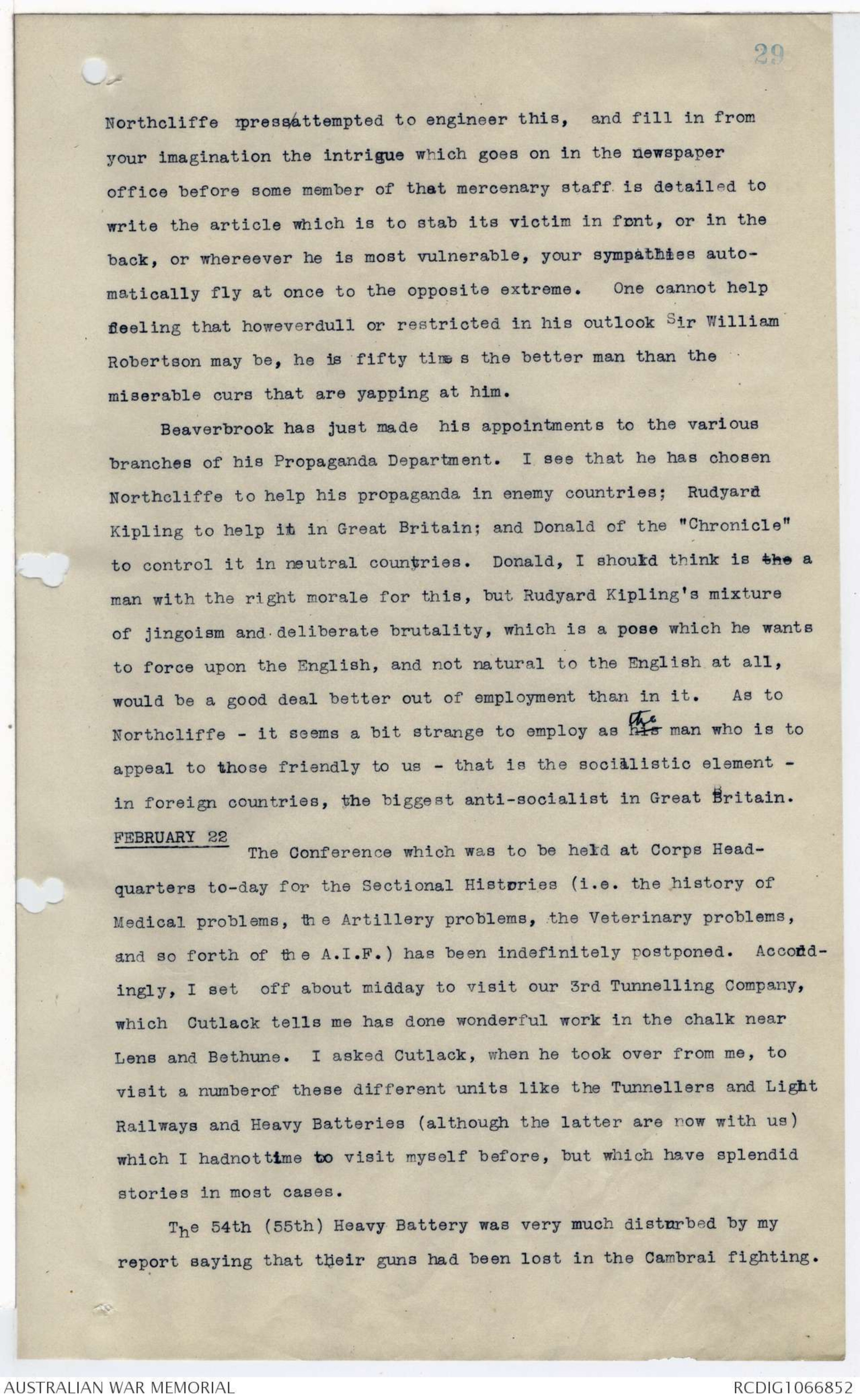
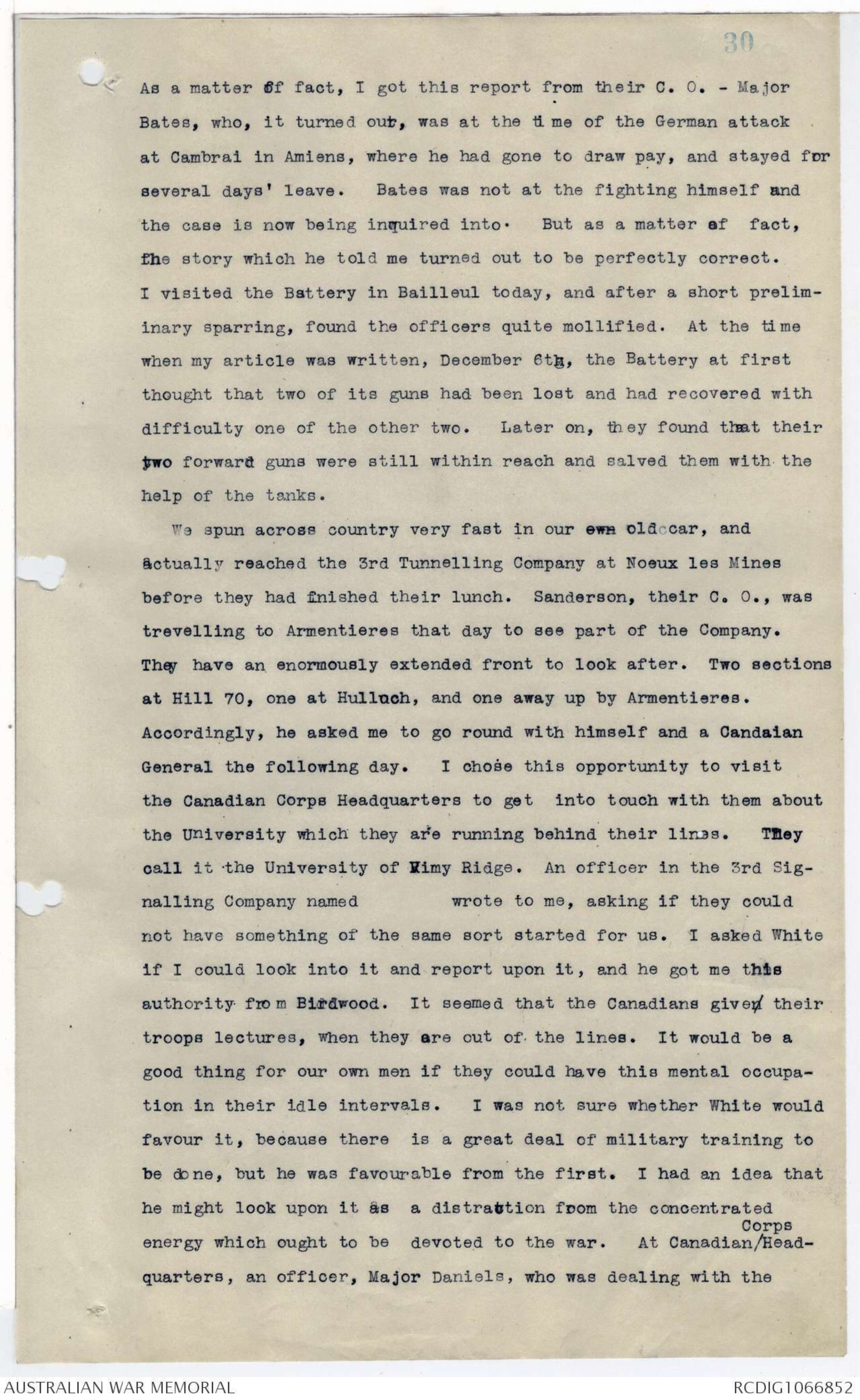
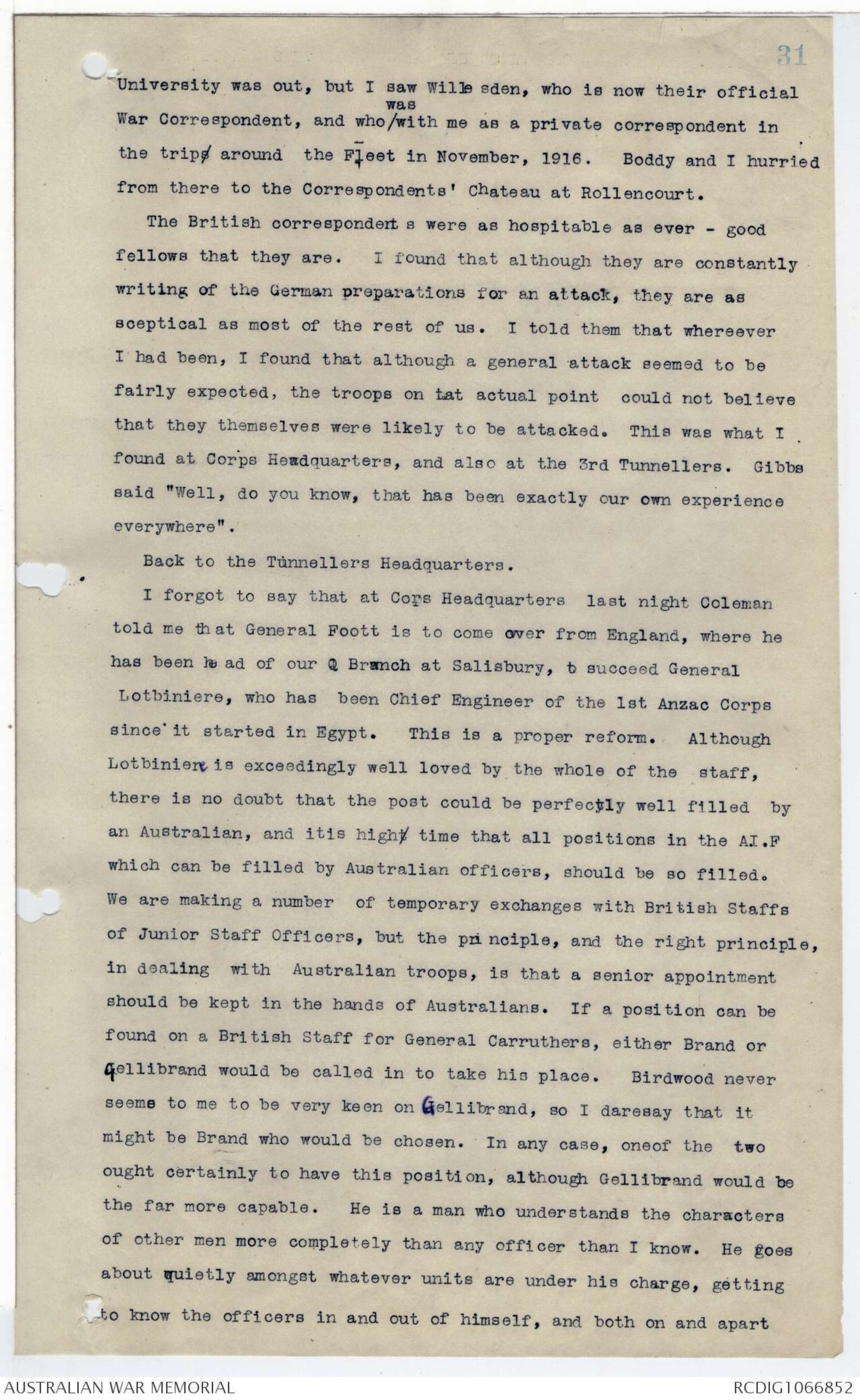
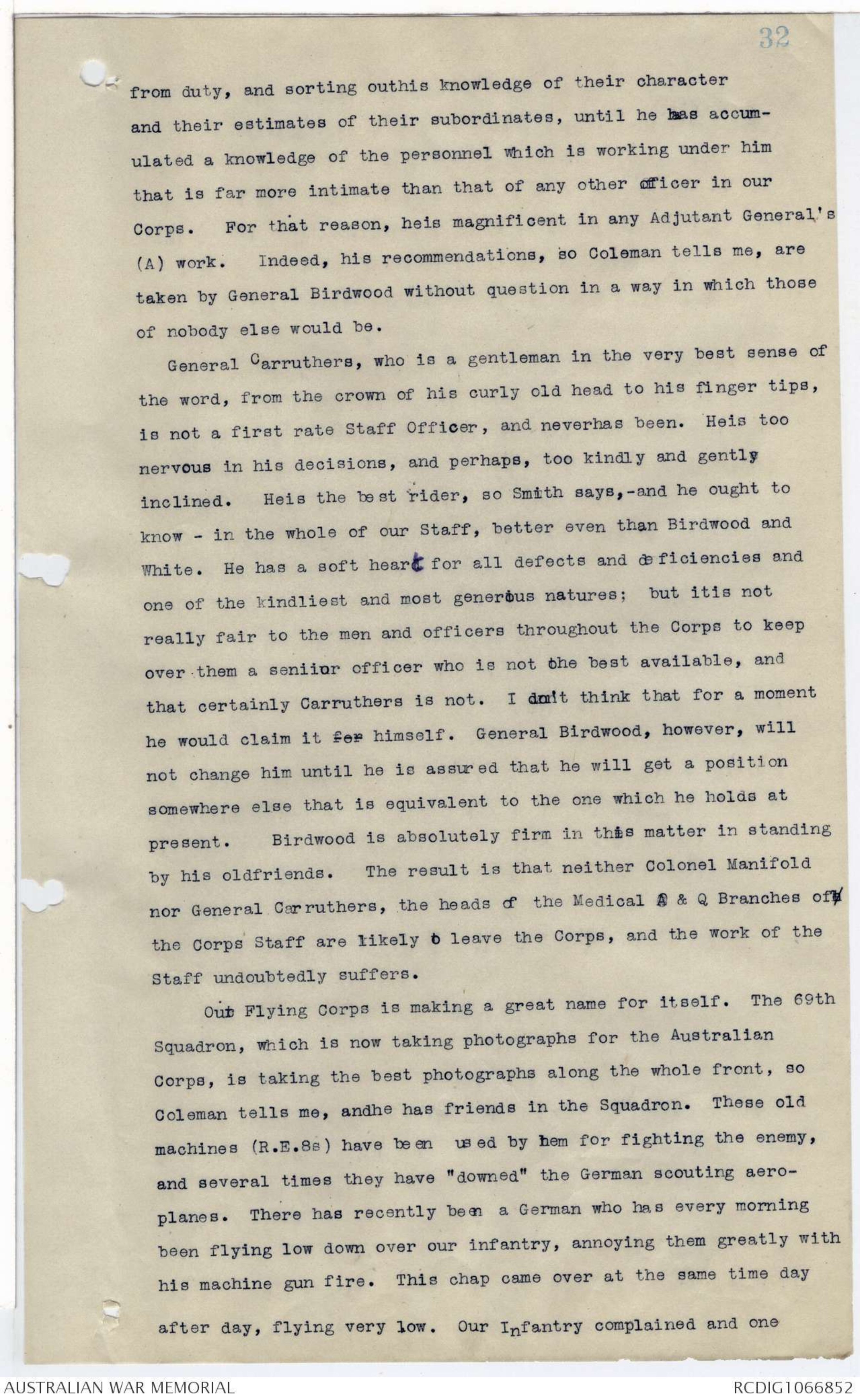
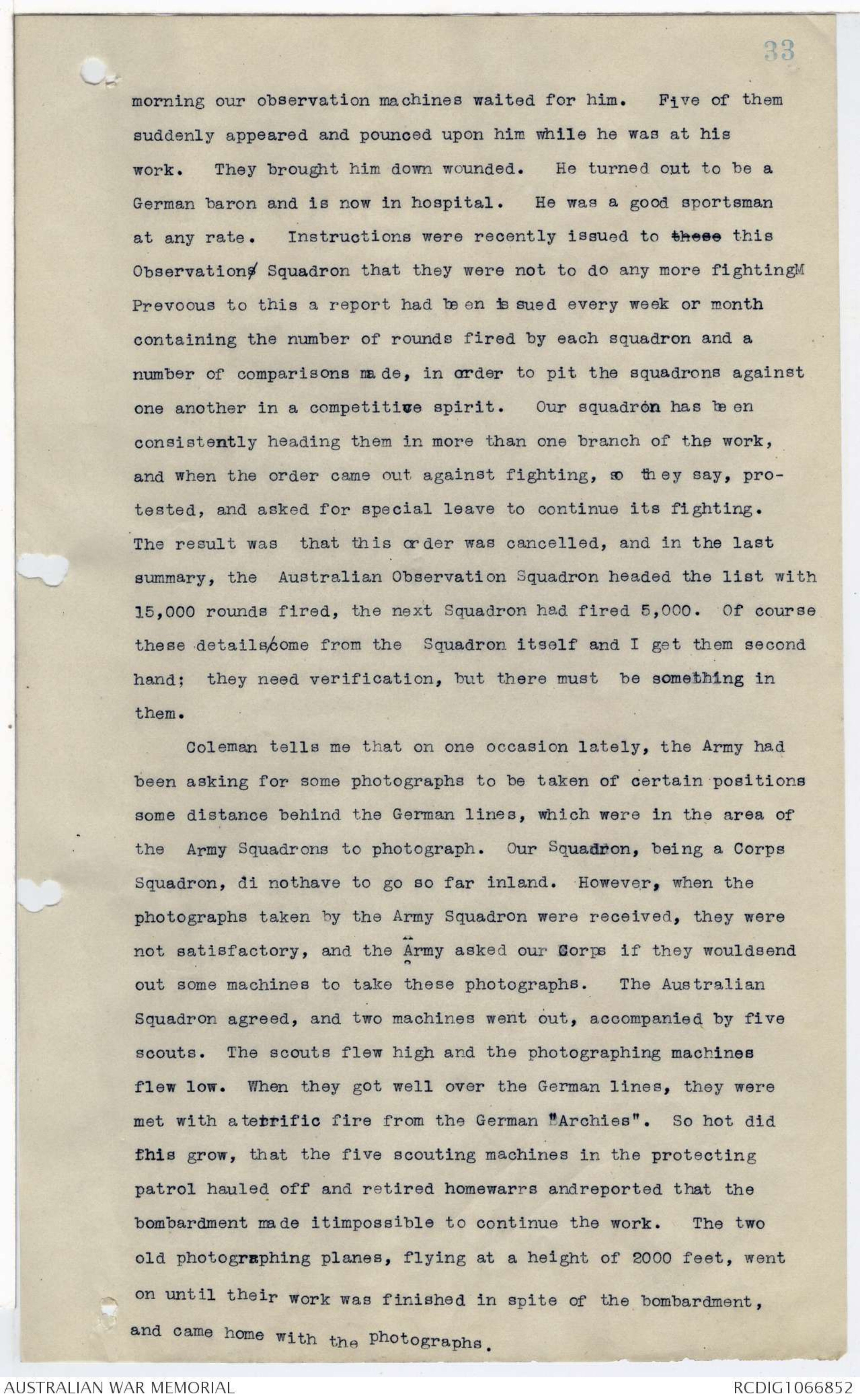
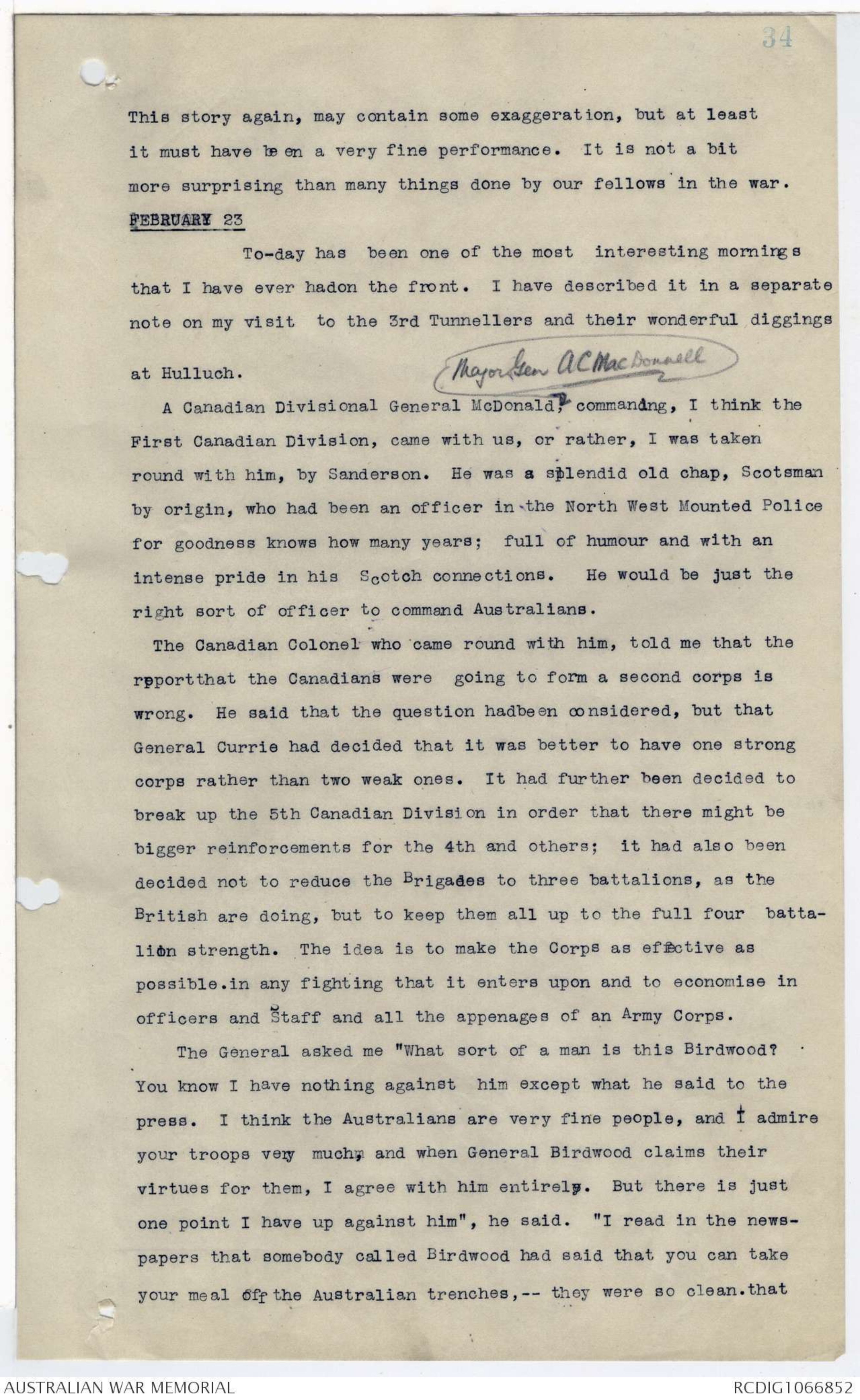
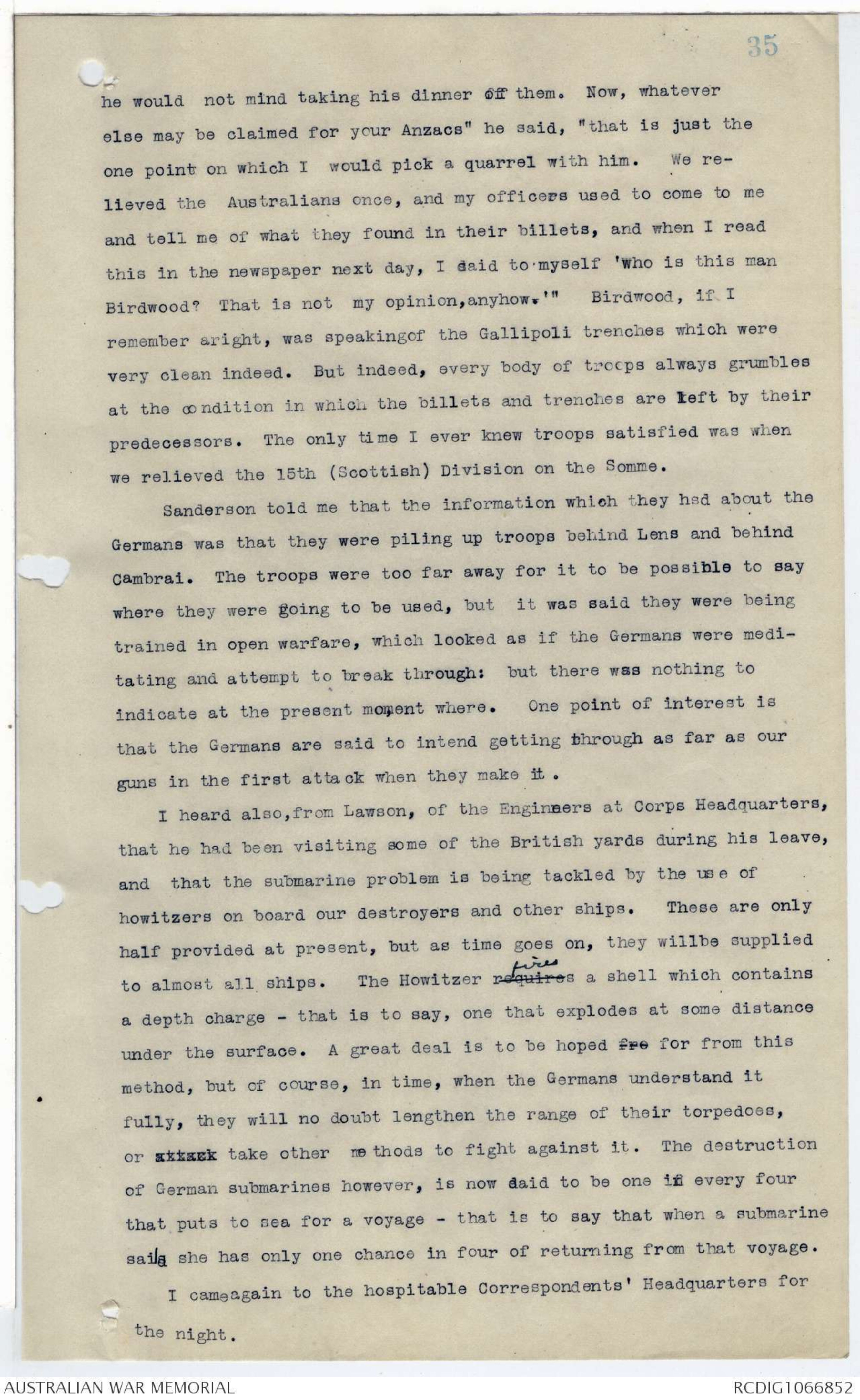
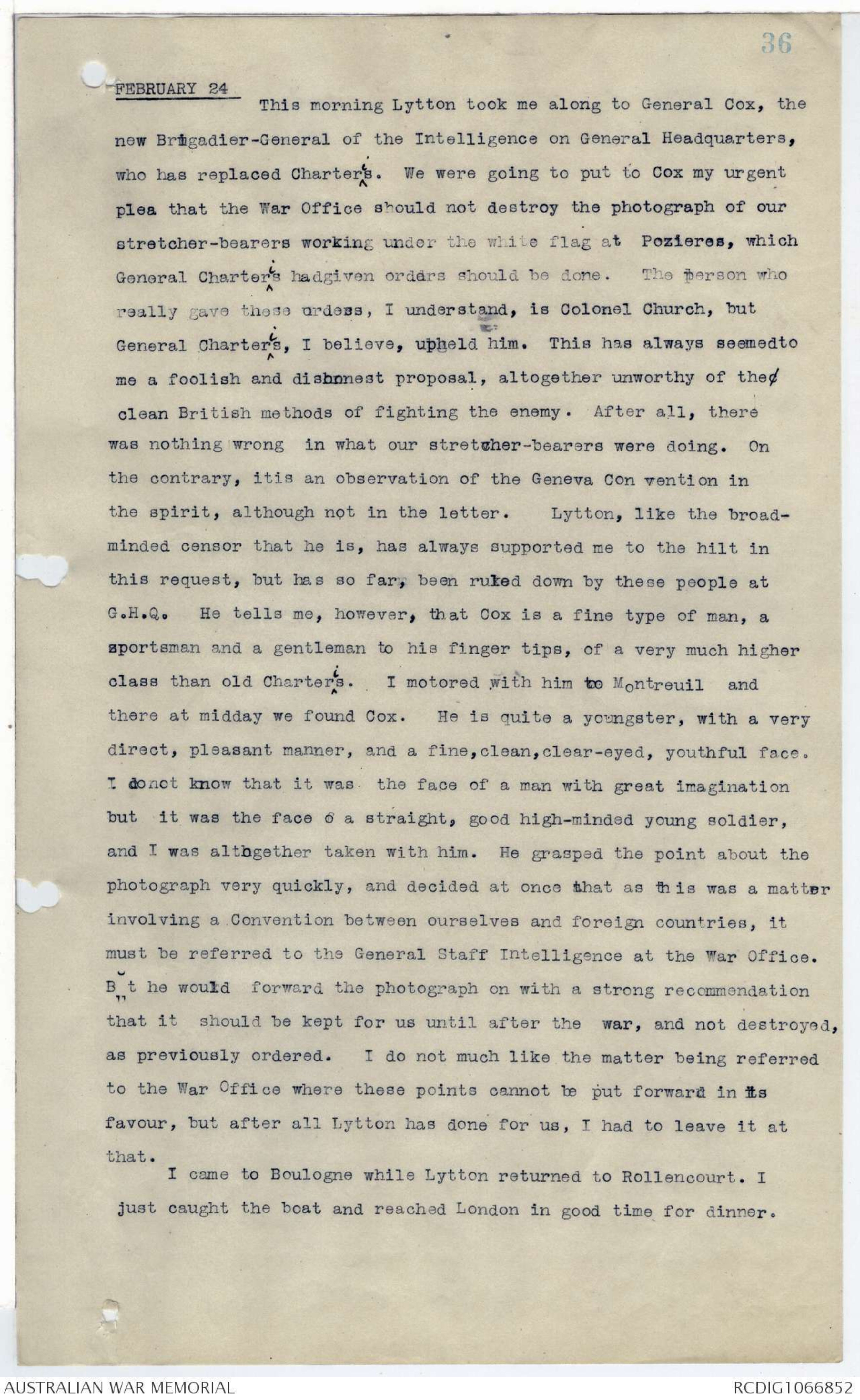
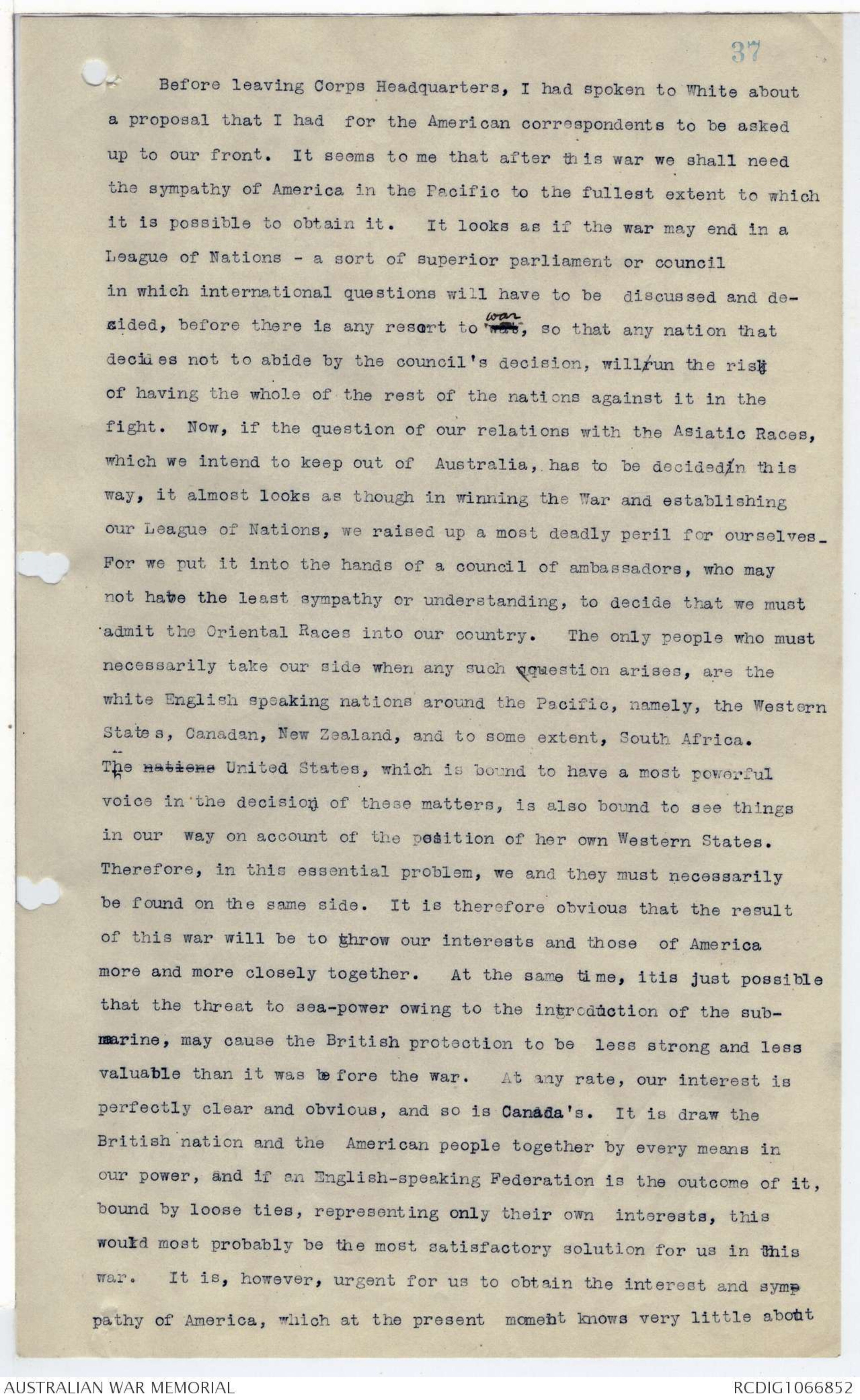
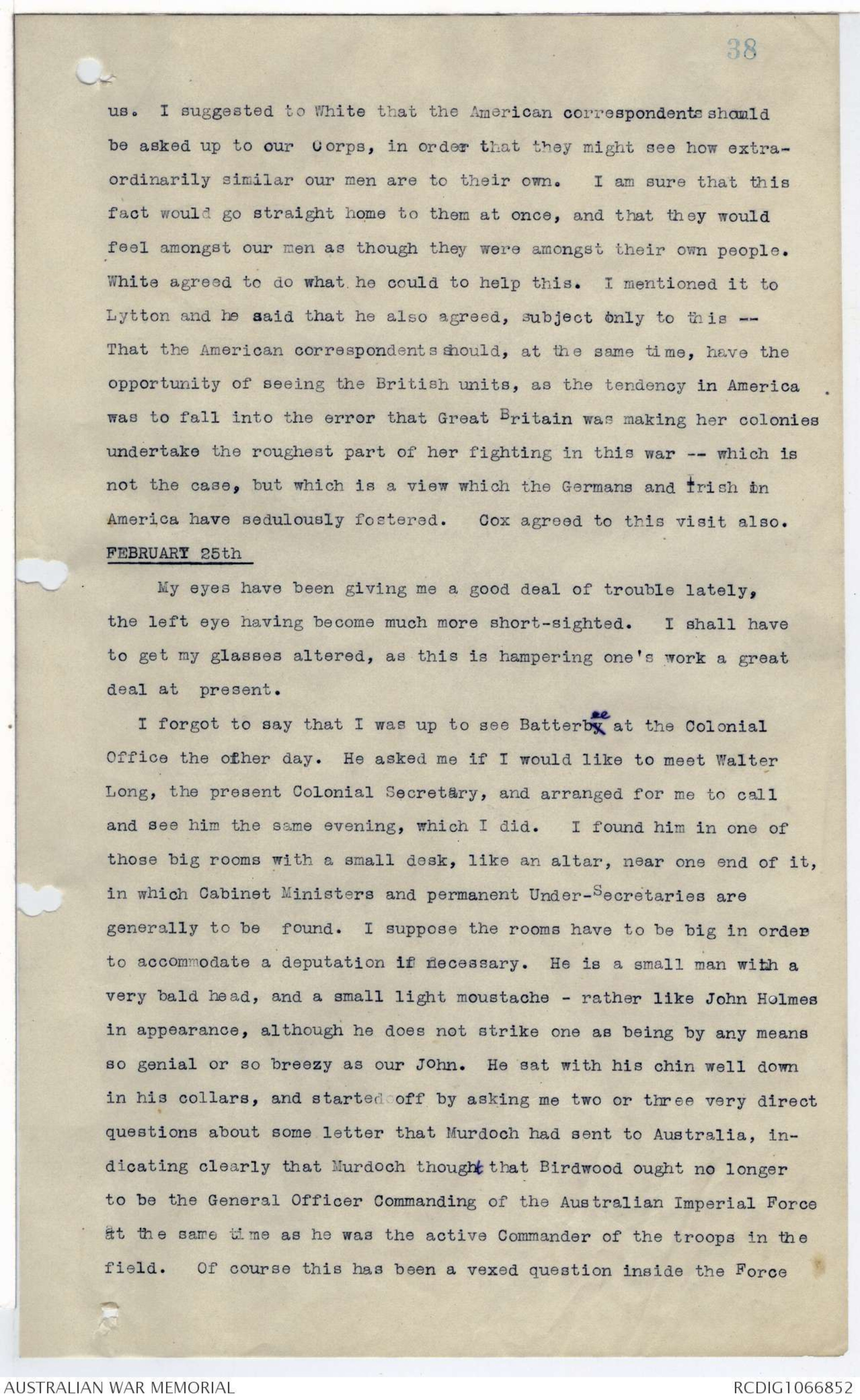
29
Northcliffe press/attempted to engineer this, and fill in from
your imagination the intrigue which goes on in the newspaper
office before some member of that mercenary staff is detailed to
write the article which is to stab its victim in front, or in the
back, or wherever he is most vulnerable, your sympathies automatically
fly at once to the opposite extreme. One cannot help
feeling that however dull or restricted in his outlook Sir William
Robertson may be, he is fifty times the better man than the
miserable curs that are yapping at him.
Beaverbrook has just made his appointments to the various
branches of his Propaganda Department. I see that he has chosen
Northcliffe to help his propaganda in enemy countries; Rudyard
Kipling to help it in Great Britain; and Donald of the "Chronicle"
to control it in neutral countries. Donald, I should think is the a
man with the right morale for this, but Rudyard Kipling's mixture
of jingoism and deliberate brutality, which is a pose which he wants
to force upon the English, and not natural to the English at all,
would be a good deal better out of employment than in it. As to
Northcliffe - it seems a bit strange to employ as his the man who is to
appeal to those friendly to us - that is the socialistic element -
in foreign countries, the biggest anti-socialist in Great Britain.
FEBRUARY 22
The Conference which was to be held at Corps Headquarters
to-day for Sectional Histories (i.e. the history of
Medical problems, the Artillery problems, the Veterinary problems,
and so forth of the A.I.F.) has been indefinitely postponed. Accordingly,
I set off about midday to visit our 3rd Tunnelling Company,
which Cutlack tells me has done wonderful work in the chalk near
Lens and Bethune. I asked Cutlack, when he took over from me, to
visit a numberof these different units like the Tunnellers and Light
Railways and Heavy Batteries (although the latter are now with us)
which I hadnot time to visit myself before, but which have splendid
stories in the most cases.
The 54th (55th) Heavy Battery was very much disturbed by my
report saying that their guns had been list in the Cambrai fighting.
30
As a matter of fact, I got this report from their C.O. - Major
Bates, who, it turned out, was at the time of the German attack
at Cambrai in Amiens, where he had gone to draw pay, and stayed for
several days' leave. Bates was not at the fighting himself and
the case is now being inquired into. But as a matter of fact,
the story which he told me turned out the be perfectly correct.
I visited the Battery in Bailleul today, and after a short preliminary
sparring, found the offices quite mollified. At the time
when my article was written, December 6th, the Battery at first
thought that two of its guns had been lost and had recovered with
difficulty one of the other two. Later on, they found that their
two forward guns were still within reach and salved them with the
help of the tanks.
We spun across country very fast in our own old car, and
actually reached the 3rd Tunnelling Company at Noeux les Mines
before they had finished their lunch. Sanderson, their C.O., was
travelling to Armentieres that day to see part of the Company.
They have an enormously extended front to look after. Two sections
at Hill 70, one at Hulluch, and one away up by Armentieres.
Accordingly, he asked me to go round with himself and a Canadian
General the following day. I chose this opportunity to visit
the Canadian Corps Headquarters to get into touch with them about
the University which they are running behind their lines. They
the University of Vimy Ridge. An officer in the 3rd Signalling
Company named wrote to me, asking if they could
not have something of the same sort started for us. I asked White
if I could look into it and report upon it, and he got me this
authority from Birdwood. It seemed that the Canadians given their
troops lectures, when they are out of the lines. It would be a
good thing for our own men if they could have this mental occupation
in their idle intervals. I was not sure whether White would
favour it, because there is a great deal of military training to
be done, but he was favorable from the first. I had an idea that
he might look upon it as a distraction from the concentrated
energy which ought to be devoted to the war. At Canadian ^Corps
Headquarters, an officer, Major Daniels, who was dealing with the
31
University was out, but I saw Willesden, who is now their official
War Correspondent, and who ^was with me as a private correspondent in
the trips around the Fleet in November, 1916. Boddy and I hurried
from there to the Correspondents' Chateau at Rollencourt.
The British correspondents were as hospitable as ever - good
fellows they are. I found that although they are constantly
writing of the the German preparations for an attack, they are as
sceptical as most of the rest of us. I told them that wherever
I had been, I found that although a general attack seemed to be
fairly expected, the troops on tat actual point could not believe
that they themselves were likely to be attacked. This was what I
found at Corps Headquarters, and also at the 3rd Tunnellers. Gibbs
said "Well, do you know, that has been exactly our own experience
everywhere".
Back to the Tunnellers Headquarters.
I forgot to say that at Corps Headquarters last night Coleman
told me that General Foott is to come over from England, where he
has been head of our Q Branch at Salisbury, to succeed General
Lotbiniere, who has been Chief Engineer of the 1st Anzac Corps
since it started in Egypt. This is a proper reform. Although
Lotbiniere is exceedingly well loved by the whole of the staff,
there is no doubt that the post could be perfectly well filled by
an Australian, and itis hight time that all positions in the A.I.F.
which can be filled by Australian officers, should be so filled.
We are making a number of temporary exchanges with British Staffs
of Junior Staff Officers, but the principle, and the right principle,
in dealing with Australian troops, is that a senior appointment
should be kept in the hands of Australians. If a position can be
found on a British Staff for General Carruthers, either Brand or
Gellibrand would be called in to take his place. Birdwood never
seems to me to be very keen on Gellibrand, so I daresay that it
might be Brand who would be chosen. In any case, oneof the two
ought certainly to have this position, although Gellibrand would be
the far more capable. He is a man who understands the characters
of other men more completely than any officer than I know. He goes
about quietly amongst whatever units are under his charge, getting
to know the officers in and out of himself, and both on and apart
32
from duty, and sorting out his knowledge of their character
and their estimates of their subordinates, until he has accumulated
a knowledge of the personnel which is working under him
that is far more intimate than that of any other officer in our
Corps. For that reason, he is magnificent in and Adjutant General's
(A) work. Indeed, his recommendations, so Coleman tells me, are
taken by General Birdwood without question in a way in which those
of nobody else would be.
General Carruthers, who is a gentleman in the very best sense of
the word, from the crown of his curly old head to his finger tips.
is not a first rate Staff Officer, and neverhas been. Heis too
nervous in his decisions, and perhaps, too kindly and gently
inclined. He is the best rider, so Smith says,-and he ought to
know - in the whole of our Staff, better even than Birdwood and
White. He has a soft heart for all defects and deficiencies and
one of the kindliest and most generous natures; but itis not
really fair to the men and officers throughout the Corps to keep
over them a senior officer who is not the best available, and
that certainly Carruthers is not. I don't think that for a moment
he would claim it for himself. General Birdwood, however, will
not change him until he is assured that he will get a position
somewhere else that is equivalent to the one which he holds at
present. Birdwood is absolutely firm in this matter in standing
by his oldfriends. The result is that neither Colonel Manifold
nor General Carruthers, the heads of the Medical A & Q Branches oft
the Corps Staff are likely to leave the Corps, and the work of the
Staff undoubtedly suffers.
Our Flying Corps is making a great name for itself. The 69th
Squadron, which is now taking photographs for the Australian
Corps, is taking the best photographs along the whole front, so
Coleman tells me, andhe has friends in the Squadron. These old
machines (R.E.8s) have been used by them for fighting the enemy,
and several times they have "downed" the German scouting aeroplanes.
There has recently been a German who has every morning
been flying low down over the infantry, annoying them greatly with
his machine gun fire. This chap came over at the same time day
after day, flying very low. Our Infantry complained and one
33
morning our observation machines waited for him. Five of them
suddenly appeared and pounced upon him while he was at his
work. They brought him down wounded. He turned out to be a
German baron and is now in hospital. He was a good sportsman
at any rate. Instructions were recently issued to these this
Observations Squadron that they were not to do any more fightingM
Prevocus to this report had been issued every week or month
containing the number of rounds fired by each squadron and a
number of comparisons made, in order to pit the squadrons against
one another in a competitive spirit. Our squadron has been
consistently heading them inn more than one branch of the work,
and when the order came out against fighting, so they say, protested,
and asked for special leave to continue its fighting.
The result was that this order was cancelled, and in the last
summary, the Australian Observation Squadron headed the list with
15,000 rounds fired, the next Squadron had fired 5,000. Of course
these details/come from the Squadron itself and I get them second
hand: they need verification, but there must be something in
them.
Coleman tells me that on one occasion lately, the Army had
been asking for some photographs to be taken of certain positions
some distance behind the German lines, which were in the area of
the Army Squadron to photograph. Our Squadron, being a Corps
Squadron, di nothave to go so far inland. However, when the
photographs taken by the Army Squadron were received, they were
not satisfactory, and the Army asked our Corps if they wouldsend
out some machines to take these photographs. The Australian
Squadron agreed, and two machines went out, accompanied by five
scouts. The scouts flew high and the photographing machines
flew low. When they got well over the German lines, they were
met with a terrific fire from the German "Archies". So hot did
this grow, that the five scouting machines in the protecting
patrol hauled off and retired homewarrs andreported that the
bombardment made itimpossible to continue this work. The two
old photographing planes, flying at a height of 8000 feet, went
on until their work was finished in spite of the bombardment,
and came home with the photographs.
34
This story again, may contain some exaggeration, but at least
it must have been a very fine performance. It is not a bit
more surprising than many things done by our fellows in the war.
FEBRUARY 23
To-day has been one of the most interesting mornings
that I have ever had on the front. I have described it in a separate
note on my visit to the 3rd Tunnellers and their wonderful diggings
at Hulluch.
A Canadian Divisional General McDonald ^(Major Gen ACMacDonnell) commanding, I think the
First Canadian Division, came with us, or rather, I was taken
round with him, by Sanderson. He was a splendid old chap, Scotsman
by origin, who had been an officer in the North West Mounted Police
for goodness knows how many years; full of humour and with an
intense pride in his Scotch connections. He would be just the
right sort of officer to command Australians.
The Canadian Colonel who came round with him, told me that the
report that the Canadians were going to form a second corps is
wrong. He said that the question hadbeen considered, but that
General Currie had decided that it was better to have one strong
corps rather than two weak ones. It had further been decided to
break up the 5th Canadian Division in order that there might be
bigger reinforcements for the 4th and others; it had also been
decided not to reduce the Brigades to three battalions, as the
British are doing, but to keep them all up to the full four battalion
strength. The idea is to make the Corps as effective as
possible.in any fighting that it enters upon and to economise in
officers and staff and all the appenages of an Army Corps.
The General asked me "What sort of a man is this Birdwood?
You know I have nothing against him except what he said to the
press. I think the Australians are very fine people, and I admire
your troops very much, and when General Birdwood claims their
virtues for them, I agree with him entirely. But there is just
one point I have up against him", he said. "I read in the newspapers
that somebody called Birdwood had said that you can take
your meal off the Australian trenches, -- they were so clean. that
35
he would not mind taking his dinner off them. Now, whatever
else may be claimed for your Anzacs" he said, "that is just the
one point on which I would pick a quarrel with him. We relieved
the Australians once and my officers used to come to me
and tell me of what they found in their billets, and when I read
this in the newspaper next day, I said to myself 'who is this man
Birdwood? That is not my opinion,anyhow." Birdwood, if I
remember alright, was speakingof the Gallipoli trenches which were
very clean indeed. But indeed, every body of troops always grumbles
at the condition in which the billets and trenches are left by their
predecessors. The only time I ever knew troops satisfied was when
we relieved the 15th (Scottish) Division on the Somme.
Sanderson told me that the information which they had about the
Germans was that they were piling up troops behind Lens and behind
Cambrai. The troops were too far away for it to be possible to say
where they were going to be used, but it was said they were being
trained in open warfare, which looked as if the Germans were meditating
and attempt to break through: but there was nothing to
indicate at the present moment where. One point of interest is
that the Germans are said to intend getting through as far as our
guns in the first attack when they make it.
I heard also, from Lawson, of the Engineers at Corps Headquarters,
that he had been visiting some of the British yards during his leave.
and that the submarine problem is being tackled by the use of
howitzers on board our destroyers and other ships. These are only
half provided at present, but as time goes on, they willbe supplied
to almost all ships. The Howitzer requires fires a shell which contains
a depth charge - that is to say, one that explodes at some distance
under the surface. A great deal is to be hoped fre for from this
method, but of course, in time, when the Germans understand it
fully, they will no doubt lengthen the range of their torpedoes,
or attack take other methods to fight against it. The destruction
of German submarines however, is now said to be one in every four
that puts to sea for a voyage - that is to say that when a submarine
sails she has only one chance in four of returning from that voyage.
I came again to the hospitable Correspondents' Headquarters for
the night.
36
FEBRUARY 24
This morning Lytton took me along to General Cox, the
new Brigadier-General of the Intelligence on General Headquarters.
who has replaced Charteris. We were going to put to Cox my urgent
plea that the War Office should not destroy the photograph of our
stretcher-bearers working under the white flag at Pozieres, which
General Charteris had given orders should be done. The person who
really gave these orders, I understand, is Colonel Church, but
General Charteris, I believe, upheld him. This has always seemed to
me a foolish and dishonest proposal, altogether unworthy of thec
clean British methods of fighting the enemy, After all, there
was nothing wrong in what our stretcher-bearers were doing. On
the contrary, itis an observation of the Geneva Convention in
the spirit, although not in the letter. Lytton, like the broadminded
censor that he is, has always supported me to the hilt in
this request, but has so far, been ruled down by these people at
G.H.Q. He tells me, however, that Cox is a fine type of man, a
sportsman and a gentleman to his finger tips, of a very much higher
class than old Charteris. I motored with him to Montreuil and
there at midday we found Cox. He is quite a youngster, with a very
direct, pleasant manner, and a fine, clean, clear-eyed, youthful face.
I do not know that it was the face of a man with great imagination
but it was the face o a straight, good high-minded young soldier,
and I was altogether taken with him. He grasped the point about the
photograph very quickly, and decided at once that as this was a matter
involving a Convention between ourselves and foreign countries, it
must be referred to the General Staff Intelligence at the War Office.
But he would forward the photograph on with a strong recommendation
that it should be kept for us until after the war, and not destroyed,
as previously ordered. I do not much like the matter being referred
to the War Office where these points cannot be put forward in its
favour, but after all Lytton has done for us, I had to leave it at
that.
I came to Boulogne while Lytton returned to Rollencourt. I
just caught the boat and reached London in time for dinner.
37
Before leaving Corps Headquarters, I had spoken to White about
a proposal that I had for the American correspondents to be asked
up to our front. It seems to me that after this was we shall need
the sympathy of America in the Pacific to the fullest extent to which
it is possible to obtain it. It looks as if the war may end in a
League of Nations - a sort of superior parliament or council
in which international questions will have to be discussed and decided,
before there is any resort to ware war, so that any nation that
decides not to abide by the council's decision, will run the risk
of having the whole of the rest of the nations against it in the
fight. Now, if the question of our relations with the Asiatic Races,
which we intend to keep out of Australia, has to be decided/in this
way, it almost looks as though in winning the War and establishing
our League of Nations, we raised up a most deadly peril for ourselves -
For we put it into the hands of a council of ambassadors, who may
not have the least sympathy or understanding, to decide that we must
admit the Oriental Races into our country. The only people who must
necessarily take our side when any such qquestion arises, are the
white English speaking nations around the Pacific, namely, the Western
States, Canadan, New Zealand, and to some extent, South Africa.
The nations United States, which is bound to have the most powerful
voice in the decision of these matters, is also bound to see things
in our way on account of the position of her own Western States.
Therefore, in this essential problem, we and they must necessarily
be found on the same side. It is therefore obvious that the result
of this war will be to throw our interests and those of America
more and more closely together. At the same time, itis just possible
that the threat the sea-power owing to the introduction of the
submarine, may cause the British protection to be less strong and less
valuable than it was before the war. At any rate, our interest is
perfectly clear and obvious, and so is Canada's. It is draw the
British nation and the American people together by every means in
our power, and if an English-speaking Federation is the outcome of it,
bound by loose ties, representing only their own interests, this
would most probably be the most satisfying solution for us in this
war. It is, however, urgent for us to obtain the interest and sympathy
of America, which at the present moment knows very little about
38
us. I suggest to White that the American correspondents should
be asked up to our Corps , in order that they might see how extraordinarily
similar our men are to their own. I am sure that this
fact would go straight home to them at once, and that they would
feel amongst our men as though they were amongst their own people.
White agreed to do what he could to help this. I mentioned it to
Lytton and he said that he also agreed, subject only to this --
That the American correspondents should, at the same time, have the
opportunity of seeing the British units, as the tendency in America
was to fall into the error that Great Britain was making her colonies
undertake the roughest part of her fighting in this war -- which is
not the case, but which is a view which the Germans and Irish in
America have seriously fostered, Cox agreed to this visit also.
FEBRUARY 25th
My eyes have been giving me a good deal of trouble lately,
the left eye having become more short-sighted. I shall have
to get my glasses altered, as this is hampering one's work a great
deal at present.
I forgot to say that I was up to see Battersbyee at the Colonial
Office the other day. He asked me if I would like to meet Walter
Long, the present Colonial Secretary, and arranged for me to call
and see him the same evening, which I did. I found him in one of
those big rooms with a small desk, like an altar, near one end of it,
in which Cabinet Ministers and permanent Under-Secretaries are
generally to be found. I suppose the rooms have to be big in order
to accommodate a deputation if necessary. He is a small man with a
very bald head, and a small light moustache - rather like John Holmes
in appearance, although he does not strike one as being by any means
so genial or so breezy as our John. He sat with his chin well down
in his collars, and started off by asking me two or three very direct
questions about some letter that Murdoch had sent to Australia, indicating
clearly that Murdoch thought that Birdwood ought no longer
to be the General Officer Commanding of the Australian Imperial Force
at the same time as he was the active Commander of the troops in the
field. Of course, this has been a vexed question inside the Force
 Loretta Corbett
Loretta CorbettThis transcription item is now locked to you for editing. To release the lock either Save your changes or Cancel.
This lock will be automatically released after 60 minutes of inactivity.